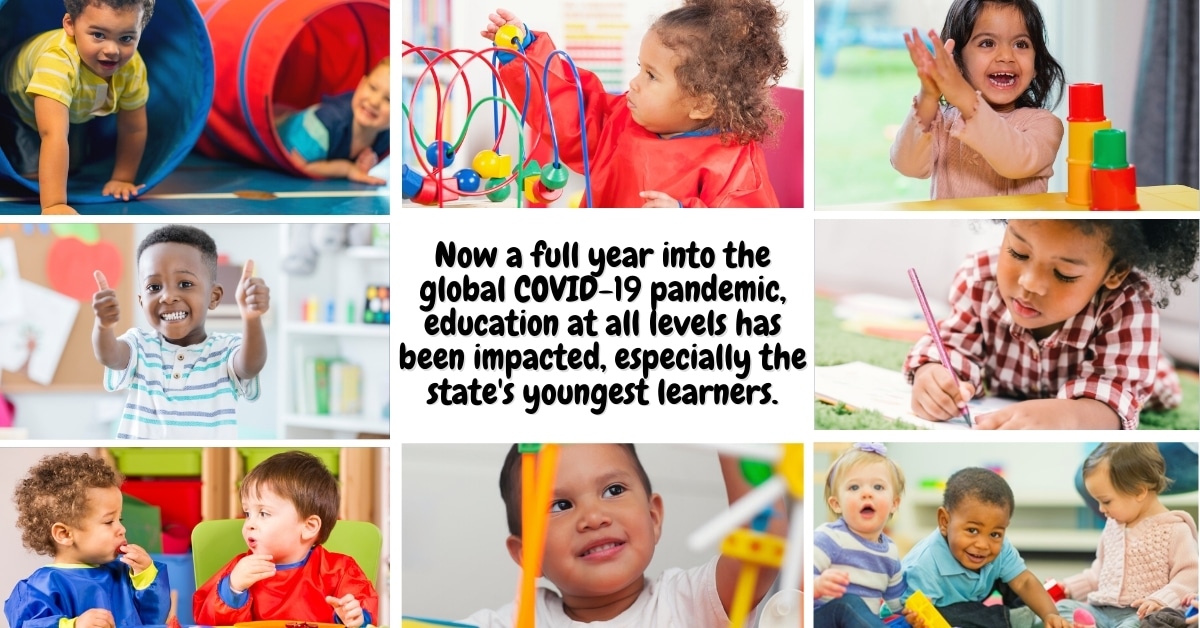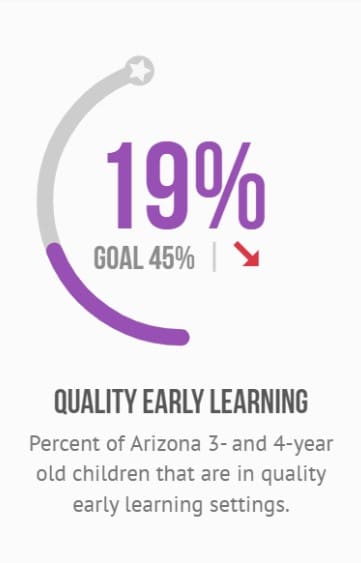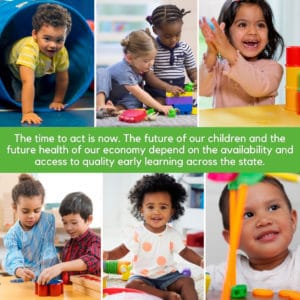
Disinvestments in early education are hurting children and families
Now a full year into the unprecedented COVID-19 pandemic, education at all levels has been impacted; in some ways, it’s forever changed. And the students who are most likely to face the longest-term effects are also the youngest.
In recently updated data, the Arizona Education Progress Meter showed a decline of 3% in Quality Early Learning over the past two years. Enrollment in quality early learning among Arizona 3- and 4-year-olds now stands at 19%, down from 22% two years ago. Arizona must take quick action to reverse this decrease and ensure all children have a strong start to their education, which is foundational to their future success and Arizona’s ability to meet the goals in the Education Progress Meter.
The recent decline in Quality Early Learning is based on two major factors:
1. COVID-19 has decimated the childcare industry
Three- and 4-year-old children thrive on interpersonal learning and relationships with caring adults who are key to their development. Having both teachers and peers together in a face-to-face setting is a large part of the academic, physical and social-emotional growth that sets these children on their paths to success.
When the pandemic struck Arizona last year, early learning programs in communities, homes and churches were shuttered. In fact, within the first two weeks of the pandemic, Arizona’s Quality First program led by First Things First lost more than half of its licensed childcare and pre-K spaces, leaving tens of thousands of children without these vital early learning opportunities.
Today, numbers have improved, but an estimated one-third of programs are still closed and
41% still have reduced capacity for the number of children they can serve.
Even early learning programs that have since reopened are on shaky financial ground as lower enrollments and increased COVID-related costs have stretched budgets to a breaking point. Increased costs have been driven by a reduction in program capacity due to physical distancing requirements and by the need to purchase additional cleaning and sanitation supplies, including personal protective equipment (PPE).
2. Loss of the Preschool Development Grant
In 2014, Arizona secured a federal Preschool Development Grant (PDG) to build or enhance a preschool program infrastructure that would enable the delivery of high-quality preschool and expand high-quality preschool programs in targeted high-need communities.
Over the course of four years, this $80 million grant served more than 9,400 children all over the state. And it was working: In its last fiscal year, 90% of PDG 4-year-olds were meeting or exceeding educational standards.
The grant was designed to allow states to expand access to programs, while planning to make their own investments and design a funding mechanism that would be sustainable beyond the PDG. A few years into the PDG, the state applied for a second round of funding to continue the programming. But in part because Arizona could not show that it had contributed state funding to support early education and continue gains the PDG made possible, the state was denied the second round of PDG funding.
Arizona’s disinvestment in early learning drove the loss of the
$20M Preschool Development Grant.
Unfortunately, Arizona has not invested in quality early learning since the cuts of the Great Recession. Some programs, including the Early Childhood Block Grant, were eliminated and never restored. Coupled with disinvestments in childcare subsidies for the working poor (down to $7 million from $70 million), Arizona now faces an early childhood education crisis.
Gaps in access
Research tells us that a child’s brain develops more rapidly from birth to five than at any other time in life and when young children don’t have access to interactive, high quality learning opportunities, it shows. Gaps in vocabulary can appear as young as nine months and by age 3, vocabulary, attention and general knowledge are strong predictors of how well that child will be able to read in the third grade. And we know that how well a child reads in third grade is a predictor for future academic success. Children who aren’t included in quality early learning settings are more likely to need remediation in kindergarten and those gaps can often persist for years. Especially for children who don’t learn easily, it can be hard to ever catch up from these setbacks.
An estimated 48% of Arizonans live in childcare deserts, which are
especially prevalent in rural and low-income areas.
Even before the pandemic, early learning programs were in short supply. A 2018 report estimated that 48% of Arizonans lived in a childcare desert, meaning there was no childcare in their ZIP code or there were three kids for every childcare slot available (source). This gap has only widened as on-going COVID challenges have closed many programs or forced others to reduce enrollment. Even when care is available, the high cost (as much as tuition as a state university in some areas) can price out many families whose children need early learning support the most.
The side effects of the current provider shortage aren’t just academic. When families can’t find a reliable and safe place for their child, they are often forced to either leave their children with whatever caregiver is available or they make the choice that they cannot return to the workforce and earn much-needed income.
Making strides in some areas
For two years, Arizona has moved in the wrong direction on early childhood education. If we want our children to be successful, and our state to be competitive, we must do better. The Quality Early Learning metric in the Education Progress Meter impacts all of the others as it sets the foundation for student success in the early grades and beyond.
Some cities and organizations have recognized the value of early learning and they’re working to improve access. The City of Tempe developed Tempe PRE, which created 360 preschool slots for low-income residents in its pilot year. Last year, the Phoenix Suns donated $2.6 million to the City of Phoenix’s Head Start program, which allowed them to keep hundreds of seats open that would have otherwise closed. LAUNCH Flagstaff has created the Elevate PreK program that, starting next year, will provide full-day, high-quality preschool. And many cities and counties are utilizing federal CARES Act COVID relief funds to aid early childhood programs.
While the COVID-19 pandemic has sparked innumerable challenges to early childhood education, it also presents an opportunity to open the conversation about how we can provide early learning opportunities to all Arizona children and families who want them. How can our system better prepare all children to make these vital years more preparative for the future? What changes must the state make to reach the goal of having 45% of Arizona’s 3- and 4-year-olds enrolled in a quality early learning setting?
One immediate piece of legislation we are supporting this year is House Bill 2015, which would ramp up over three years to provide $20M in state funding to replace the Preschool Development Grant that was lost in 2019.
We must begin making sustainable investments like these that restore eliminated state funding and provide a long-term funding solution to make quality early learning accessible to lay the foundation for literacy and academic achievement.
The time to act is now. The future of our children and the future health of our economy depend on the availability and access to quality early learning across the state.
Expect More Arizona has pooled resources with Achieve60AZ and College Success Arizona to advance a cohesive education agenda to reach the goals outlined in the Arizona Education Progress Meter.
AZECA is an alliance of 55 cross-sector partners statewide who are working together to give every Arizona child a great start in life. Together, we are Arizona’s shared and unified voice on early childhood policy, providing informed messages and credible resources that help leaders create positive change for our children. These efforts are designed to ensure that all Arizona children are prepared for Kindergarten and are on track to succeed by the end of third grade.
The Arizona Early Childhood Funders Collaborative is an initiative of Arizona Grantmakers Forum and is dedicated to exchanging and linking ideas, knowledge, research and resources to focus statewide attention on a seamless continuum of quality early childhood services that strengthen Arizona’s young children, families and communities. The Collaborative does this by engaging government, businesses, organizations and philanthropic partners from within and outside of Arizona.


